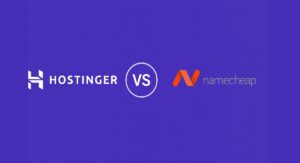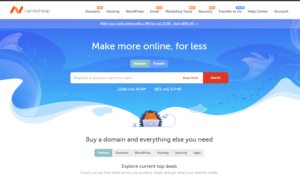Choosing the right web hosting provider is one of the most critical decisions you’ll make for your online presence—whether you’re a small business owner, a blogger, or launching your first e-commerce site. Not only does your choice directly impact your website’s performance and security—it also affects your costs, scalability, and overall user experience. In 2025, two hosting giants consistently top the lists for budget-conscious buyers: Hostinger and Namecheap. This in-depth analysis will help you navigate this competition and identify which hosting provider best aligns with your needs and budget.

Understanding Budget Hosting Essentials
Before delving into the specific competitors, let’s clarify what budget web hosting entails. Budget hosting, typically using shared hosting plans, seeks to provide maximum value at minimum cost—ideal for personal projects, small businesses, beginner bloggers, and anyone prioritizing affordability. The essentials you should expect:
- Value-driven pricing: Low monthly costs, ideally with transparent billing.
- Performance: Consistent uptime, fast load times, and reliable infrastructure.
- Beginner-friendly features: Easy-to-use control panels, site builders, and one-click installations.
- Security: SSL certificates, protection against malware and DDoS threats.
- Support: Responsive, accessible customer help, ideally 24/7.
Both Hostinger and Namecheap claim to deliver on all these fronts, but the details matter. Let’s break down how they actually stack up.
Pricing and Plans Overview
Budget is often the gateway to choosing a hosting provider, especially for newcomers. Here’s how these two contenders compare in 2025:
Hostinger’s Feature-Packed Offerings {#hostingerdetail}
Hostinger markets itself as an affordable, feature-rich brand—backed by modern infrastructure, competitive pricing, and generous plans:
- Single Shared Hosting ($1.99/month):
- Host one website, 50 GB SSD storage, 100 GB bandwidth.
- Includes free SSL and basic email.
- Best for small, static sites or portfolios.
- Premium Shared Hosting ($2.99/month):
- Host up to 100 websites, 100 GB SSD storage, unlimited bandwidth.
- Free domain for 1 year, SSL, weekly backups, and email.
- Ideal for growing blogs and small business sites.
- Business Shared Hosting ($3.99/month):
- Host up to 100 websites, 200 GB SSD storage, unlimited bandwidth.
- Daily backups, Cloudflare CDN, free domain, complimentary WordPress staging.
- Suitable for businesses needing more reliability and security.
Pros:
- Loads of bundled tools (WordPress optimization, site builder, etc.).
- LiteSpeed web servers and global CDN for improved speed.
- Competitive starting rates.
Cons:
- Renewal prices can rise 2–3x from the initial term.
- Some advanced features (like priority support) require upgrades.

Namecheap’s Straightforward Solutions {#namecheapdetail}
Namecheap’s reputation is built on transparency, fixed pricing, and ease of use. The 2025 lineup:
- Stellar Plan ($1.98/month):
- Host up to 3 websites, 20 GB SSD storage, unmetered bandwidth.
- Free SSL, email accounts, and domain registration for 1 year.
- Perfect for bloggers or micro-businesses.
- Stellar Plus ($2.98/month):
- Unlimited websites and SSD storage, auto-backups, unmetered bandwidth.
- Free migrations and email.
- Good for multi-site users.
- Stellar Business ($4.98/month):
- Cloud-based infrastructure, more dedicated resources, and higher reliability.
- Geared toward startups and resource-intensive sites.
Pros:
- Flat renewal pricing—no sticker shock at checkout.
- Easy account management, bundled email, and migration.
- Clear cost breakdown with no hidden fees.
Cons:
- Fewer “premium extras” included compared to Hostinger.
- Entry-level plans can lag under heavier loads.
Performance: Speed, Uptime, and Reliability
Performance is one of the most significant differentiators between these providers:
Hostinger’s Edge
- Uses LiteSpeed web servers, known for exceptional speed and efficient handling of traffic spikes.
- Global network of data centers, ensuring rapid delivery no matter where users are.
- 99.9% uptime guarantee backed up by consistent testing and reliable infrastructure.
- NVMe SSDs and advanced cache systems deliver TTFB (Time to First Byte) under 400ms in most global tests.
Namecheap’s Consistency
- Also promises 99.9% uptime, but real-world load testing shows slight dips compared to Hostinger, especially during peak periods on shared plans.
- Traditional infrastructure with SSD storage—keeps things solid, if not fast.
- Suitable for steady, moderate web traffic, but can experience latency when website usage spikes unexpectedly.
Recent performance benchmarks (2025) consistently show Hostinger outperforming Namecheap for global audiences, especially in page load and server response times.
User Experience and Interface
Hostinger: Modern Simplicity
- Custom-built hPanel: visually intuitive, mobile-friendly, easy navigation.
- Simple tools for new users: quick installs (WordPress, WooCommerce), staging, DNS management.
- Clean dashboards make even complex tasks less intimidating.
Namecheap: Reliable Familiarity
- Uses the tried-and-true cPanel interface.
- Advanced users may feel right at home with the traditional structure.
- No-frills approach: robust functionality, though outdated graphics and workflow compared to Hostinger’s hPanel.
Security Features Compared
Hostinger
- Free SSL certificates on all plans.
- Advanced BitNinja security: real-time protection against malware, DDoS, brute-force attacks, and more.
- Automatic backups—daily or weekly, plan-dependent.
- WordPress-specific vulnerability scanning and patching.
Namecheap
- Free SSL certificates.
- Two-factor authentication for secure logins.
- Spam and malware filters for emails.
- Basic backup and site security, with some upsells for advanced features.
While both providers take security seriously, Hostinger edges ahead thanks to its automations and inclusion of comprehensive threat mitigation tools, even on entry-level plans.
Customer Support and Service Quality
Hostinger
- 24/7 live chat support with fast response times.
- Extensive self-help resources: tutorials, guides, and community forums.
- Support praised for patience, clarity, and problem-solving.
Namecheap
- 24/7 live chat support, especially strong in domain name and basic hosting queries.
- Large knowledge base, ticket system, and helpful onboarding.
- Web hosting issues can take longer to resolve, particularly on lower-tier plans.
Both are reliable, but Hostinger’s investment in specialized staff for hosting-specific support gives it a slight edge for complex troubleshooting.
Hidden Costs and Renewal Pricing
- Hostinger: Low initial pricing, but be aware renewal rates can be up to three times the introductory price. Some advanced features/add-ons are extra.
- Namecheap: Fixed, transparent renewal costs—what you see is what you pay. Fewer surprise fees and upsells make budgeting easier.
Real-World Case Studies & Testimonials
Case Study 1: Hostinger
A travel blog moved from another host to Hostinger’s Premium Shared Hosting for better speed and uptime. Within a month, page load times improved by 25%. Search ranking and audience engagement both increased, attributed to faster site performance and reliable uptime.
Case Study 2: Namecheap
An e-commerce startup began with Namecheap’s Stellar Plus plan due to its straightforward pricing and free migration offer. The store ran smoothly for most of the year, but during a big sale event, page speed slowed and they eventually upgraded to a higher-tier plan to maintain a seamless checkout experience.

Final Verdict
Hostinger’s Strengths
- Outstanding speed and uptime—especially for internationally targeted websites.
- Loads of built-in features and robust security.
- Modern, easy-to-use tools for site management.
Namecheap’s Strengths
- Predictable, transparent pricing with no renewal gimmicks.
- Great for those who want to host several small sites cheaply.
- Reliable, if not cutting-edge, for simple web projects.
Best Budget Hosting Choice of 2025?
If blazing speed and feature-rich hosting matter most, Hostinger is the top choice. If you value cost-certainty and simplicity above all, Namecheap remains a trustworthy alternative.
Ultimately, the best hosting provider for you depends on your unique needs. Consider your budget, desired performance, and support expectations. Both Hostinger and Namecheap lead the budget hosting market for good reason—now it’s up to you to decide which strengths matter most for your online goals.




1 thought on “Hostinger vs Namecheap 2025: Finding the Best Budget Hosting Provider”